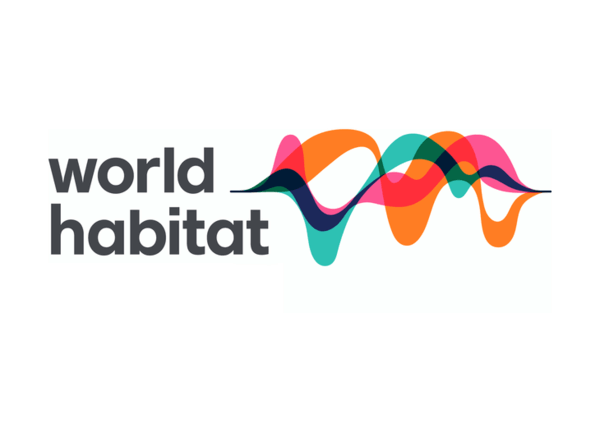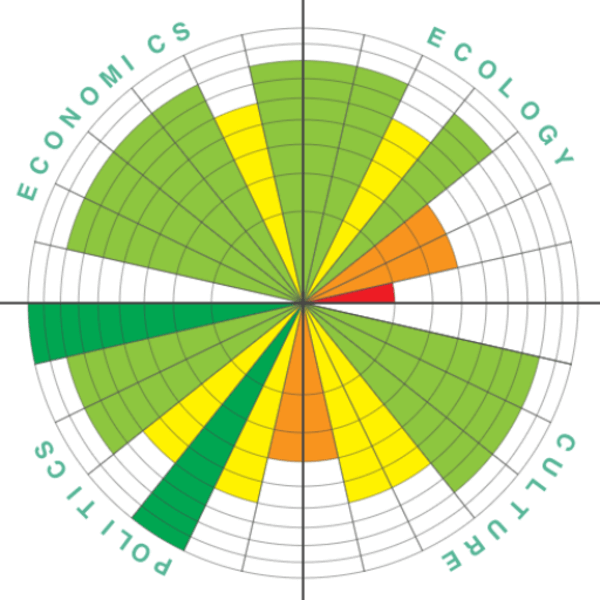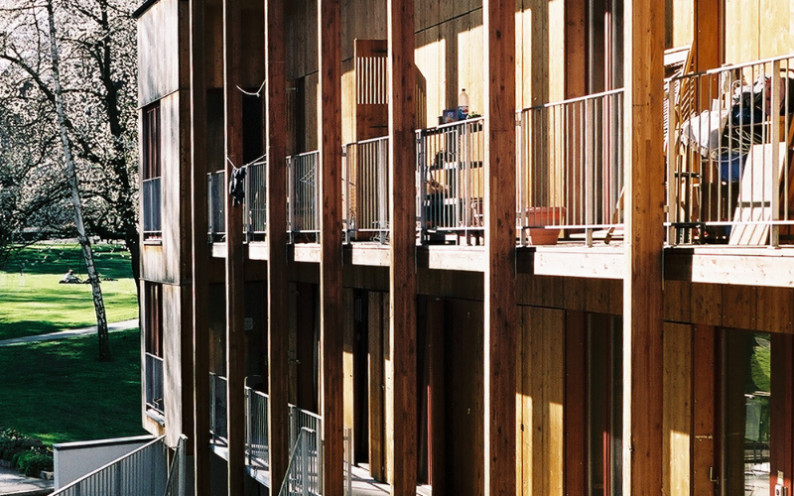 - © World Habitat Awards 2024
- © World Habitat Awards 2024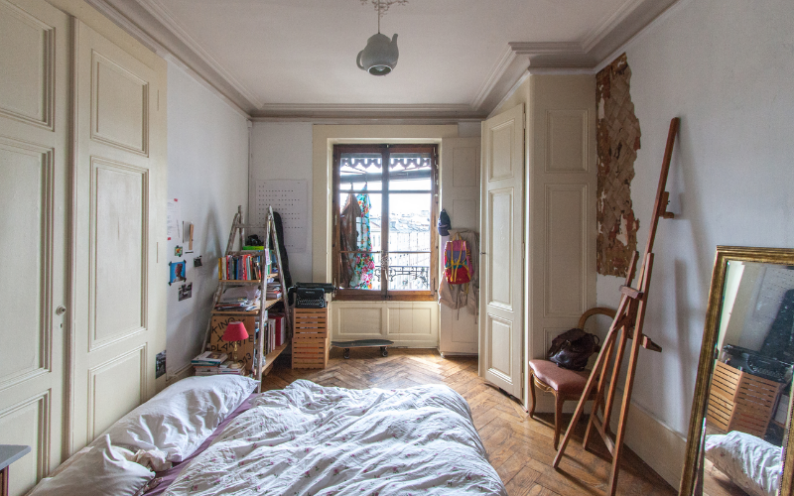 - © World Habitat Awards 2024
- © World Habitat Awards 2024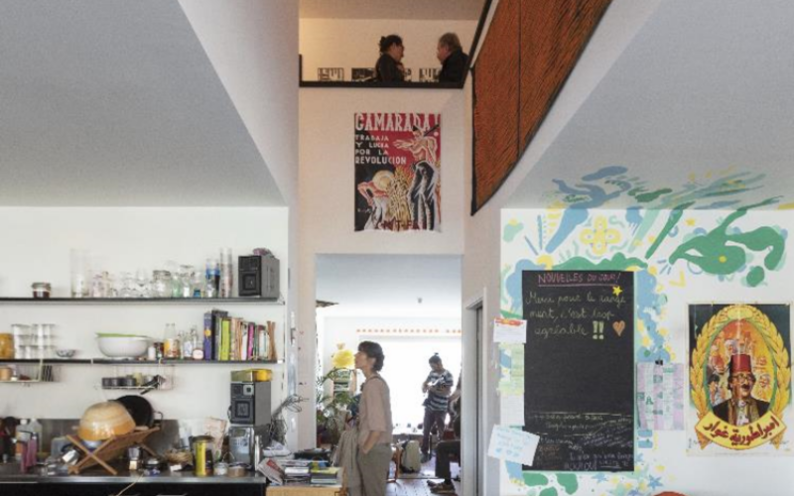 - © World Habitat Awards 2024
- © World Habitat Awards 2024
City
Geneva
Main actors
Local Government, City Government, Supranational / Intergovernmental Institutions, Private Sector, NGO / Philanthropy, Community / Citizen Group
Project area
Inner City
Duration
Ongoing since 1986
La Ciguë is a non-profit, self-managed and independent cooperative which aims to develop permanently affordable homes for people in training in Geneva, Swizerland. Its core values are the participation of members, non-speculation, and the protection of the environment. Its main activities are dedicated to:
- Constructing and/or renovating buildings owned by the cooperative.
- Searching private homes to lease from public and private owners.
- Renting rooms to its members.
- Maintaining the housing stock.
- Implementing social activities with members and other actors.
All residents buy one share of the cooperative and become members who elect their board of directors. This board is composed of eight residents and non-residents, as well as five members of the work team and make decisions on the general policy of the co-operative. It hires and delegates the operational management to a work team of nine employees (equivalent to 5.5 full time employees).
For each building or group of buildings there is a local assembly of residents which elects its own coordinators, who in turn liaise with each other in a council of coordinators, and with the work team to deal with issues and proposals from the members.
La Ciguë has enabled over 8,000 young people from all over the world to study in good conditions and become emancipated in Europe’s most expensive city. It demonstrates a creative and innovative housing model that successfully develops permanent affordable housing in a challenging context, while holding high the values of social inclusion, mutualisation and sharing, sobriety, cultural and gender equality.
Originally published by World Habitat and reproduced here with its permission. LINK
World Habitat Awards
This project was awarded the 'World Habitat Awards' in the following category: Silver.
Affordable housing has been one of the revindications from Geneva’s alternative and youth movements since the late 1960s. These led to a squatter’s movement in the 1980s in resistance to urban renewal plans of the Municipality. which aimed at demolishing central workers neighbourhoods in benefit of new real estate developments. Both responding to a social need for housing and experimenting new ways of shared living, art and culture, the Geneva squatting movement grew to one of the most important in Europe.
In 1986, a student union of the University of Geneva occupied buildings of the university in protest of the lack of affordable student accommodations in the city. This event eventually led to a dialogue with the City Government, and the creation of La Ciguë.
The first “agreement for loan use” - which allowed a third party (la Ciguë) to rent a property from an owner on behalf of its members- was celebrated a few weeks later, to house 10 students. This contract type was first repeated with substandard properties owned by the Municipality which needed retrofit, and progressively also with affordable housing foundations and private owners.
Objective
La Ciguë aims at enabling their members to experience affordable shared living, sharing facilities at building and neighbourhood level, and participating in a vibrant cooperative life that fosters social interaction, mutual support, and self-management. It was also developed as an alternative model to the strict rules of the traditional student homes (gender separation, curfew, no parties, no common spaces, etc.) as a way for emancipation and free thought.
The project aims to continue expanding, with 250 rooms planned in three new projects to be delivered in 2026 and 2030.
Activities can be divided into rental of properties for temporary use and housing project development.
Temporary rent: The cooperative has developed strong partnerships with public and non-profit organisations as well as private property managers to rent empty properties for a limited or undefined time. Currently, la Ciguë manages 39 properties under different lease agreements benefiting 430 people:
- 64 rooms in three buildings leased on an undetermined timeframe.
- 366 rooms in 37 buildings or houses on a one- to three-years lease.
The typologies and sizes of the apartments or houses depend on the offer. Most of the rooms are in shared flats where residents have an individual room and share the kitchen, living room, bathroom(s), garden, terraces, and other facilities. This is the model favoured by La Ciguë to create social life. However, some of their accommodations are studios for people who prefer or need to live alone. All of them are in the central areas of the metropolitan area of Geneva (see map).
Project development: A few years after starting their work, La Ciguë decided to constitute a permanent housing stock by developing its own building or retrofit projects. This had the objective of creating high environmental quality homes with shared spaces between residents and the neighbourhood, to foster social interaction. The first building was inaugurated in 1998. The architects who won the Europan competition for this project designed two wooden buildings with eight apartments each and shared spaces. The project won the Interassar prize 1999. Seven other projects followed until now and three others are planned in the coming years.
Altogether, the built projects include 311 rooms:
- 1998: Montbrillant 18, centre of Geneva. 32 rooms in eight flats, one shared terrace open to the neighbourhood.
- 2004: Les Ouches, suburbs of Geneva. 20 rooms in two flats in a building with family homes co-developed with the CODHA cooperative, shared room, music room and studio.
- 2009: Pavillons, centre of Geneva. 40 rooms in eight flats, one multipurpose space, two spaces for non-profits.
- 2009: Clos Voltaire, centre of Geneva, renovation of an 18th century villa. 30 rooms in two clusters, one multipurpose space open to the neighbourhood. T
- 2011: Coulouvrenière, centre of Geneva. 48 rooms in eight flats, one multipurpose space and terrace, commercial spaces.
- 2013. Pont d’Avre, centre of Geneva. 23 rooms in three duplex clusters with shared facilities in each cluster. La Ciguë’s office is on the ground floor. 6
- 2015. Chaponnière, centre of Geneva, renovation of a building from the late 19th century. 48 rooms in eight shared flats and a studio, one multipurpose space available to external people, commercial spaces.
- 2018. Vergers, Meyrin, new eco-district. 70 rooms in 10 flats of different typologies, one multipurpose space, commercial spaces, one restaurant.
All the buildings are built on public land from the City of Geneva, the City of Meyrin or the Foundation for the Promotion of Low-Cost Housing and Cooperative Housing (FPLC), with a 99-years land lease that is intended to be renewed in perpetuity. The cooperative owns the buildings and works with several private developers for the construction or retrofit.
The different commercial spaces owned by La Ciguë in its buildings are rented to different social purposes: four restaurants, two bike-repair shops, a neighbourhood centre, a Buddhist centre, and eight workshops for artists and craftspeople. Four multipurpose spaces are shared with members as well as local associations.
Inclusive and democratic principles and management: The criteria to join the cooperative are:
- Be of adult age (+18 years).
- Be under training as a main activity (studies, apprenticeship, internship, university assistant) at least 12 hours a week.
- Have an annual income lower than CHF 36,000 ($44,200 USD). The legal minimum income for a full-time job in Geneva is CHF 56,784 ($63,440 USD) a year.
The 739 current members are aged between 18 and 53 years, but 81% are aged between 21 and 31, and 50% are aged between 24 and 28 years. 55% of them are women. They come from all the continents from 70 countries: 51.3% from Switzerland, 25.7% other European countries, 10.1% Sub-Saharan Africa, 6.8% Latin America, 3.1% Asia, 1.8% Middle East and North Africa and 1.2% North America and Oceania.
Types of studies followed by members:
- 45% university studies
- 40% technical and professional studies
- 5% other types of studies.
- 10% interns in companies, United Nations, or NGOs.
There is no waiting list for the homes. Every person fulfilling the criteria can look for a private room from La Ciguë by participating in an introduction session given by members, after which interested people receive the advertisements about new vacances per email. The residents of each cluster apartment have the liberty to establish their specific criteria and choose who will join them when someone moves out. Candidates must provide a motivation letter and may be invited for a visit and interview. When someone has been selected by a group, they sign a rent contract with La Ciguë and purchase one share of the cooperative.
Once a person has joined the cooperative, they can stay for a maximum of five years in La Ciguë’s homes, to ensure a turnover. A sixth year can be granted if needed and the Board can evaluate and decide on exceptions for people in vulnerable situations. On average, members stay four years.
The participation of members in the activities of the cooperative is not compulsory but essential to the democratic life. In addition to the general assembly and building assemblies, members can also volunteer in eight thematic committees which can decide on their internal functioning and implement important tasks for the cooperative.
The general assembly, board, or work team can request the creation of an ad hoc work group composed of voluntary members to research and report on a specific subject to take informed decisions. Likewise, local assemblies can create local work groups.
This decentralised and self-managed task-repartition fosters participation of the members, collective intelligence, creativity, mutual learning, and democratic and transparent decision-making. Altogether, around 70 people are constantly involved in the above-mentioned bodies, and at the level of each shared apartment, all residents organise to make decisions, plan, solve issues, etc.
Members also have a say on the design of future housing projects but also on housing and urban development policies. As an affordable housing developer, La Ciguë participates in the urban renewal and in shaping of future neighbourhoods. For example, in 2021, it launched -together with other investors- an architectural and urban planning competition and a sustainability charter for the future Semailles-Palettes district plan. The participants of La Ciguë’s habitat committee worked on the programme for the new neighbourhood where future students will live.
Cooperative – public and private partnerships: La Ciguë has worked with public authorities to try and improve their methodology and gain trust from a growing number of stakeholders to get temporary use of buildings and homes. These include the Municipal Real Estate Management (GIM), the local Public-Law Real Estate Foundations (Emile Dupont Foundation, Emma Kammacher Foundation, René and Kate Bloch Foundation), the Foundation for the Promotion of Low-Cost Housing and Cooperative Housing (FPLC), the State of Geneva Pension Fund (CPEG), the Geneva Cooperative Housing Society (SCHG), the Foundation for the Development of Art and Culture (FODAC), the municipalities of Onex, Vernier, Lancy, Perly-Certoux, Plan-les-Ouates, Thônex, and the State of Geneva. They also collaborate with a series of private property-managers.
Owners generally agree to lend la Ciguë estate that is empty awaiting renovation or demolition. After a first successful collaboration they usually entrust more properties to the cooperative. Some individual owners also entrust their vacant property for free for the social purpose of giving accommodation to low-income people in training.
La Ciguë accesses empty properties from the market or from the public and housing foundations at a maximum price of CHF 250 ($280 USD) per month per room. These rooms are then rented to members at the price of CHF 350 ($391 USD) a month, which is 55% less than the current market price for equivalent rooms (around CHF 800 - $895 USD). The average monthly fee of CHF 100 ($111 USD) levied on each room is an income for La Ciguë. Together with the 311 rooms rented out its own buildings, average monthly income per room is around CHF 370 ($413 USD) per month.
The annual income of La Ciguë was CHF 3.5M ($3.92 USD) in 2022, including rental income of commercial spaces. The principal expenses in 2022 were:
- Rent payments to owners: CHF 1.2M ($1.34M USD)
- Payment of loans and interests to banks: CHF 0.95M ($1.05M USD)
- Salaries of Staff and employer taxes: CHF 0.82M ($0.92M USD)
In 2021 the balance between incomes and expenses gave a positive result of CHF 277,835 ($310,000 USD). As a non-profit organisation, the cooperative is not allowed to generate such an important surplus. Therefore, it must allocate this positive result to concrete activities like new housing projects, security funds, members’ projects fund, international cooperation fund or local solidarity fund. The allocation is voted by the general assembly.
Total fixed assets in the eight existing buildings and three building in progress represented over CHF 37.6M ($42.1M USD) in 2021. These projects are funded with a mix of equity, subsidies, and bank loans from the Swiss Alternative Bank (BAS) and from the Foundation for the Promotion of Low-Cost Housing and Cooperative Housing (FPLC). Low-interest bonds-loans guaranteed by the Federal Bureau of Housing of the Swiss Confederation are also given by the Issuing Office for Housing Construction (CCL).
Several projects have also received subsidies for the environmental quality of the built or renovation by the City Geneva, the Geneva Cantonal Energy Office (OCEN) or the federal government. Philanthropic donators to the construction projects include the Romande Swiss Lottery Fund, the Hans Wilsdorf Foundation and University of Geneva.
In recent years, a reduction of the usual annual surplus has been observed by the cooperative. Since the beginning of the COVID-19 pandemic, which provoked the losses and reduction of student-job opportunities, the arrears of more than three consecutive rents by members have doubled, reaching more than CHF 200,000 ($223,000 USD) of debt by tenants to the cooperative in 2022.
During 2022, a net reduction of 80 homes leased to the cooperative also represented a reduction of income compared with previous years. To keep rents low, La Ciguë expects to break even with little margin in 2023. However, the organisation has put in place a plan of internal measures to improve the economic situation (improve efficiency, find other sources of financing) without having to touch neither the rents nor the salary structure.
The prospects are nevertheless good: new temporary rooms will be made available to La Ciguë during 2023, and three new construction projects (250 rooms) will be delivered by the cooperative in 2026 and 2030, reduce the cooperative’s dependence on temporary rents.
Financial impact: Through its cooperative housing model, La Ciguë has benefited an estimated of 8,000 students since 1986 who could live in decent homes in a vibrant and empowering environment.
The cooperative manages around 780 rooms which are on average 30% cheaper than equivalent rooms on the private market. Through the access criteria it focuses on people in training who have no- or a low-income and therefore have real difficulties to access accommodation that is both affordable, decent, and close to their place of study or practice.
People can stay in rooms for a maximum of five to six years to facilitate a turnover, and in exceptional cases, the board of the cooperative can allow members to stay in the cooperative for longer. This situation has increased due to the COVID-19 crisis and led to the creation of a solidarity fund for members who lost their student-jobs.
In general, when members accumulate rent arrears, the cooperative offers them to pay in instalments or refers them to public or private social assistance structures. If no agreement is found, the member must leave the cooperative and the debts are cancelled after five years if they have not been paid back. Only in a handful of cases in 37 years did the cooperative start legal proceedings, in occasions when the debt exceeded several thousands of francs.
Social impact: La Ciguë is an open minded, non-discriminatory, inclusive, and democratic organisation. Gender equality and recognition of members of the LGBTQI+ communities are an important aspect of this cooperative, may it be through the inclusive writing used in all communications from La Ciguë, or the total freedom for each cluster apartment to establish the criteria for their new members to create safe spaces for all.
Student cooperative housing represents an excellent way for newcomers to create social bonds and a commitment to a political and social ideal of the right to adequate and ecological housing. People from different origins, cultures, ages share their living space and take decisions together daily. However, each member has a private room, where their intimacy a calm to focus on their studies are respected.
Residents are responsible for setting their own rules at the flat and building scale. They vote for their representatives who liaise with their peers from other buildings, and with the work team and board of La Ciguë to propose improvements, alert on emerging issues, etc. In each apartment, representatives are responsible for organising shifts for cleaning and maintenance, collective cooking, or purchases, organising social events (meals, movie screening, gardening, sports, games, parties, etc.), as well as establishing their selection process of newcomers when a room is free.
The international cooperation fund and the local solidarity fund allow members to express their solidarity with others by deciding to implement meaningful projects for other vulnerable people locally or internationally. For instance, these funds were used to support a housing cooperative in Nicaragua and local campaigns and events organised by Geneva-based grassroots organisations on diverse subjects from rights of minors without parents, bicycle sharing to feminist music bands and sexual and bodies inclusivity.
This empowerment process is unique in student accommodation and certainly influences members in their future lives as citizens and professionals. Even though this impact is intangible, it may be one of the most relevant for the society because of the number of generations of people from over 50 countries who spend a part of their life in this living laboratory.
This model shows that there are scalable alternatives to market-based real estate, when there is cooperation, mutualisation and community-driven decision making on the built environment. In this sense the human rights focus and inspiration of La Ciguë go far beyond the canton of Geneva.
Environmental impact: Giving a use to vacant housing stock that is meant to be renovated, transformed, or demolished allows to prolongate its life cycle whilst the works are planned, or permits are delivered. This contributes to optimise the use of the city, public services, and urban amenities.
All the cooperative-driven projects were developed with the highest environmental standards of the time applicable to renovation or new built. They also provided innovations to the housing sector:
- Montbrillant 18 (1998) both buildings were built out of wood.
- Les Ourches (2004) includes wood heating (pellets), thermal and photovoltaic solar energy. Both les Ourches and the renovations of Clos Voltaire (2009) and la Chaponnière (2015) reached the Swiss Minergie3 certification.
- The Pavillon building (2009) is built in recycled concrete and thermally insulated with blown-in wood fibre and has an energy production with wood pellets and solar panels. It was the first building in Switzerland to reach the Minergie-P certification with the ECO complement.
- Coulouvrenière (2011) has an innovative energy storage system by means of two water tanks of 10,000 litres each. This seasonal storage provides energy for domestic hot water and heating. This system can potentially provide 100% of the energy needs through solar, depending on consumption. This project as well as Pont d’Avre (2013) made it to Minergie-P and ECO certification.
- Les Verger (2018) also certified Minergie-A-P and ECO.
When members they sign their rental contract, they must also sign an ecological charter which states La Ciguë’s use of the buildings in an ecologically respectful manner. This means saving energy and water, recycle waste, primarily use bicycles and public transportation. A work group on energy and water saving behaviours emerged at the end of 2022 with the dramatic increase of energy prices and sent a list of recommendations to all members.
At present, Geneva is considered Europe’s most expensive city, and within the world’s top ten at different rankings. Only 1% of the homes of the canton of Geneva are available for rent or purchase. In this context, the monthly rent prices are around CHF 25 ($28 USD) per sqm1.
Different organisations grouped in an association offer standard student residences in Geneva, with monthly prices above CHF 480 ($535 USD) for a room in a shared apartment to over CHF 820 ($915 USD) for a studio. Nevertheless, these are not enough to meet the demand for accommodation for all students, apprentices and interns who do not have a family home in the city.
Learning: La Ciguë managed to grow and prosper in the challenging context of skyrocketing real estate and land prices through their innovative model and partnerships with public, non-governmental and private stakeholders. Partnerships with important housing stakeholders and the recognition achieved by La Ciguë ensure that there will constantly be a reasonable stock of temporary leased homes in offer.
By creating its own housing stock -which currently represents 40% of its rooms-, it has managed to have a stable income for the cooperative. For now, the fluctuation in the number of temporary leased homes from one year to the other can negatively affect their economic balance. But the share of rooms in owned buildings will grow to over 55% by 2030 with three new projects.
Despite the inflation and COVID-19 crises which have affected the economy of people in training and largely increased the costs of building materials, the cooperative neither significantly increased the rents levels nor reduced the number of employees, which proves the resilience of its economic model.
Transferability and future plans: La Ciguë plans to keep growing locally in the Canton of Geneva. As important urban renewal and constructions are planned in Geneva, the cooperative will likely receive more temporary homes before they are demolished or refurbished.
Recently, new market actors have started competing with la Ciguë to use vacant homes for short-term rents in Geneva. But in 2021, la Ciguë already started a new experimental concept. It organised a call for projects to convert a vacant shopping centre meant to be transformed - which was made available by the Emma Kammacher Foundation- into temporary community housing for 18 months (from early 2022 to the summer of 2023). In this project, called Hex.ao, the architects planned with future tenants the retrofitting of a 220 sqm gallery into four 10 sqm private modular sleeping areas, a shared kitchen, a living room and a workshop. Art and design students used recycled materials and second-hand furniture to create their modular room which will eventually be dismantled and transferred to other student accommodation. La Ciguë founded this initiative (CHF 10,000 - $11,050 USD) and will receive a monthly rent of CHF 200 ($220 USD) from each resident.
As there are currently 250,000 sqm of empty office space in Geneva, la Ciguë sees potential in starting to use non-residential properties for people in training, but potentially also for migrants (not in training), in collaboration with Geneva’s General Hospice which works in accommodation for migrants.
La Ciguë has already led to other cooperative housing projects. In 1994, members of La Ciguë co-founded the famous CODAH cooperative which has become the biggest housing cooperative in the Geneva-Lausanne area with 757 homes in 20 buildings. all permanently kept affordable through cooperative ownership. They are also planning to create a network of mutual aid between Geneva cooperatives who offer homes to people in training.
In 2022, La Ciguë was invited by urbaMonde to a side-event of the Zurich Cooperative Housing Symposium to meet and exchange with other student cooperative housing organisations like Student Coop Homes (UK), Studentendorf Berlin (Germany), Ospitalita Solidale (Italy) and the NASCO network (North American Students for Co-Operation) among others. There, the idea of creating an international network emerged, to facilitate peer-to-peer knowledge exchange and help the development of new students housing cooperatives. These organisations will be further discussing this possibility in June 2023 at an official event of the International Social Housing Festival in Barcelona.
External links / documents
On Map
The Map will be displayed after accepting cookie policy
